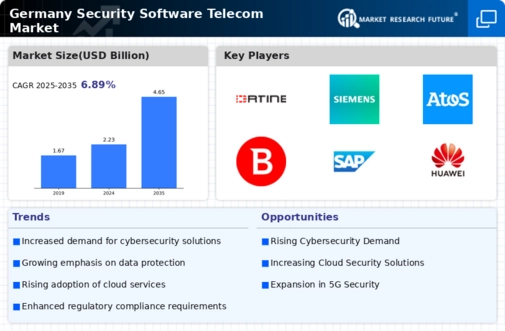Increasing Cyber Threats
The Germany security software telecom market is currently experiencing a surge in cyber threats, which appears to be driving demand for robust security solutions. With the rise of sophisticated cyber attacks, organizations are compelled to invest in advanced security software to protect sensitive data and maintain operational integrity. According to recent data, the number of reported cyber incidents in Germany has increased by over 30% in the past year, highlighting the urgent need for effective security measures. This trend suggests that businesses are prioritizing cybersecurity as a critical component of their operational strategy, thereby fueling growth in the security software sector. As companies seek to mitigate risks associated with data breaches and cyber espionage, the demand for innovative security solutions is likely to continue its upward trajectory.
Integration of Advanced Technologies
The integration of advanced technologies, such as artificial intelligence (AI) and machine learning, is becoming a pivotal driver in the Germany security software telecom market. These technologies enhance the capabilities of security software by enabling proactive threat detection and response. AI-driven solutions can analyze vast amounts of data to identify patterns and anomalies, thereby improving the overall effectiveness of security measures. As organizations seek to bolster their defenses against evolving cyber threats, the adoption of AI and machine learning in security software is likely to accelerate. This trend is indicative of a broader movement towards intelligent security solutions that not only react to threats but also anticipate them. The potential for innovation in this area suggests a dynamic future for the security software market in Germany.
Regulatory Frameworks and Compliance
The regulatory landscape in Germany significantly influences the security software telecom market. The implementation of stringent data protection laws, such as the General Data Protection Regulation (GDPR), mandates that organizations adhere to strict compliance standards. This regulatory environment compels businesses to invest in security software that not only meets legal requirements but also enhances their overall security posture. As companies navigate the complexities of compliance, the demand for specialized security solutions is expected to rise. Furthermore, the German Federal Office for Information Security (BSI) actively promotes cybersecurity initiatives, which may further stimulate market growth. The interplay between regulatory compliance and security software adoption indicates a robust market opportunity for vendors offering solutions tailored to meet these legal obligations.
Adoption of Cloud-Based Security Solutions
The shift towards cloud computing is reshaping the Germany security software telecom market. Organizations are increasingly adopting cloud-based security solutions to enhance flexibility and scalability in their security infrastructure. This trend is supported by data indicating that over 60% of German companies are now utilizing cloud services, which necessitates the integration of effective security measures. Cloud security solutions offer the advantage of real-time updates and centralized management, making them attractive to businesses seeking to streamline their security operations. As the demand for cloud services continues to grow, the corresponding need for cloud security software is likely to expand, presenting significant opportunities for vendors in the market. This evolution suggests a transformative phase for the security software sector, driven by the increasing reliance on cloud technologies.
Growing Awareness of Cybersecurity Importance
There is a notable increase in awareness regarding the importance of cybersecurity within the Germany security software telecom market. As high-profile data breaches and cyber incidents make headlines, organizations are recognizing the critical need for comprehensive security strategies. This heightened awareness is prompting businesses to allocate more resources towards cybersecurity initiatives, including the procurement of advanced security software. Surveys indicate that nearly 70% of German companies consider cybersecurity a top priority, reflecting a cultural shift towards proactive security measures. This growing recognition of cybersecurity's significance is likely to drive sustained investment in security software solutions, fostering a competitive landscape among vendors. The emphasis on cybersecurity as a fundamental aspect of business operations suggests a promising outlook for the security software market in Germany.






















